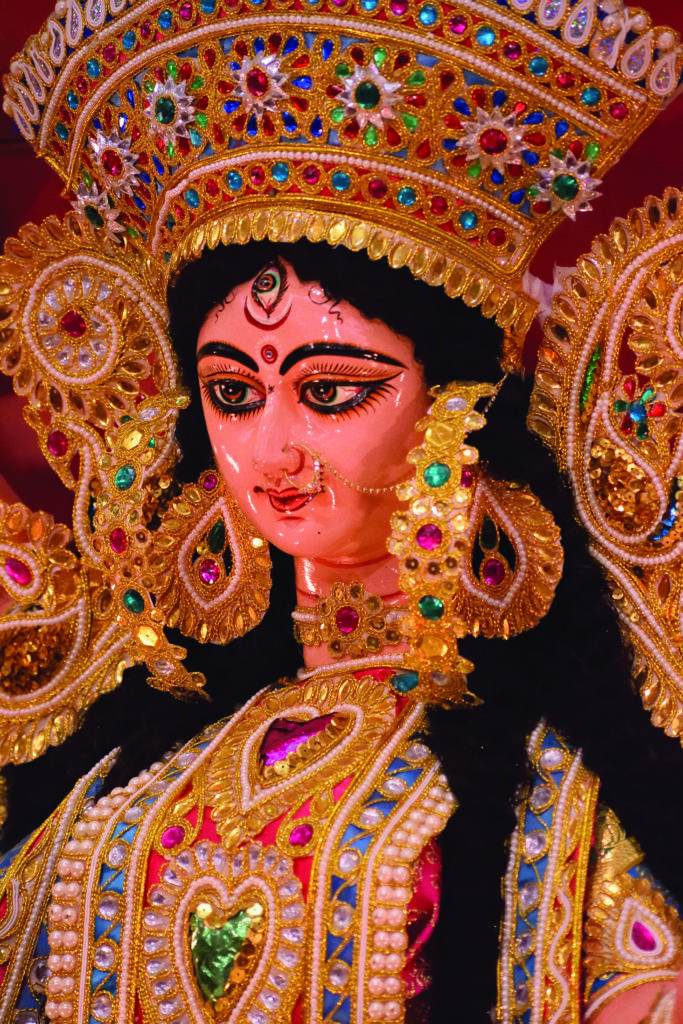Fire, Food, Friends & Some Rad Goddesses
Ididn’t know what I was signing up for when I drove to my friend’s house in Berkeley for a Devi Puja ceremony—a Hindu goddess celebration. I was all for finding my own inner goddess, and thought maybe I could find a way to attach myself to a Hindu identity to strengthen my own.
I walked in late, and noticed that people had already sat down and begun chanting. Before I could get my chanting groove on, my friend came to welcome me with a warm embrace, ushering me upstairs to her room to change into more traditional clothing. Modest, comfortable, and colorful was the dress code; she gave me a beautiful skirt in hues of blue that went to the ground.
When I returned downstairs I could see the vibrant golds and reds of flower petals, draped tablecloths, statues, and framed pictures adorning the puja table. The smell of basmati rice mixed with incense floated in the air. The harmonium hummed.
All of my senses were stimulated, drawing my focus to the present moment. Staying open and ready for anything, I joined a group whose guide tied the red string, or kalava, around our wrists. In the Hindu tradition, the string represents the unity weaving us all together, specifically we who had congregated to honor the deities. The color red represents purity or Shakti (cosmic energy), as well as bravery, generosity, and security.
Our guide explained why there are so many Hindu gods and goddesses. In the polytheistic Hindu tradition, the multiple deities are intended to make the idea of a singular, omnipotent God more accessible. The deities each have specific jobs running the various aspects of our world, just as we have earthly postal workers, teachers, civil servants, and doctors serving specific functions.

For instance, there is:
» Durga, the warrior goddess who champions the victory of good over evil.
» Lakshmi, the goddess of wealth and prosperity.
» Saraswati, the goddess of knowledge and the arts.
Given this context we proceeded to make offerings of water, light, food, and flowers to the goddesses at our sacred puja altar.
A fire roared in a brazier in the center of the room, and as we chanted to the aforementioned goddesses 108 times each, we tossed raw rice and sesame seeds into the conflagration. It was hot as hell and that alone forced me into the present moment—if only to prevent my billowing skirt from catching fire.
In that moment I was curious whether anything mystical would happen, particularly if I stayed focused while chanting to the goddesses. Maybe we’d see a smoke image of one of the goddesses? Maybe being hot as hell was necessary to keep our focus on the unfolding ceremony?
I looked at the calm, sweating faces of the people in the circle around the fire and wondered what they were experiencing. The trance-like chanting, combined with the heat of the fire, drew me into myself. I realized that the fire before me mirrored the fire within me—the fire of my intuition, the voice deep within.
It can be so difficult to listen to our intuition while going about daily life. While this ceremony helped reconnect me with mine, we don’t need a lavish ceremony to tap into it. Two simple related practices—meditation and accepting change—can help us do this every day.
After we completed the fire ceremony of chanting the names, my new friends and I shared a delicious Indian vegetarian meal while sitting in a circle on pillows. We quietly reflected upon our experiences and appreciated the physical and spiritual nourishment before us.
In the wake of this intense ceremony, each goddess felt like a literal and specific someone to call upon, to guide me in the days that followed. Visualizing, honoring, and chanting to them connected me to my intuition once again, and I walked away with a red string on my wrist as a reminder to trust that intuition in the forthcoming days.
I drove carefully home from the ceremony with a quiet peace I had only ever glimpsed before. For two full days I felt as though I’d left regular civilization before coming back. I was deep in Shakti and working to face the heat of my life. The process of bringing forth my own deep innate wisdom is a daily work in progress—just like connecting with my own inner goddess.
Shelley Karpaty lives in Silicon Valley where she has worked for 15 years as a tech industry recruiter. A yogi at heart, she considers herself a seeker of truth, knowledge, compassion, empathy, happiness, laughter, and anything to do with the human condition. ShelleyKarpaty.com